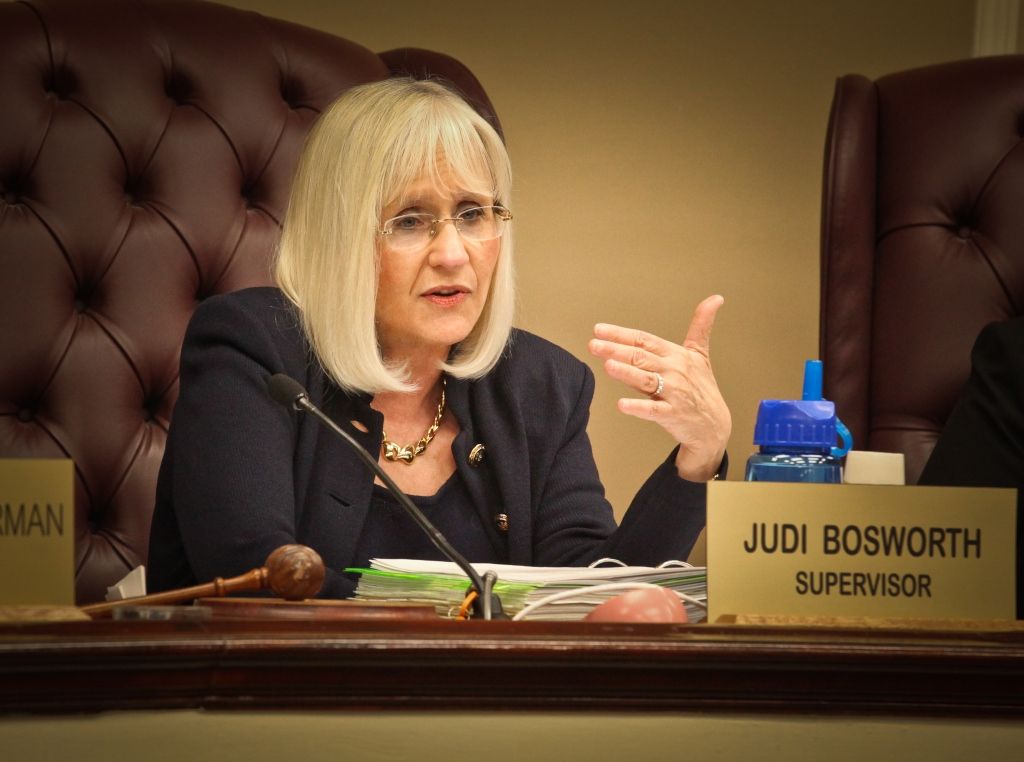Town of North Hempstead attorney Elizabeth Dvorkin Botwin said on Tuesday that a proposed town law that would require utilities to remove decommissioned poles from town roads would also apply to “double poles” on county and state roads.
“[The law] covers all poles in the Town of North Hempstead,” Botwin said during a hearing on the measure at a regularly scheduled town board meeting. “We are confident in our authority to do this.”
The proposed law would require a utility company to remove an old pole 60 days after installing a new pole or face a $500 fine.
“Double-poles” tend to occur when utility connections from damaged poles must be transferred to a new pole, or if a stronger pole is necessary to support heavier equipment. But council members have said the poles are not swapped in a timely fashion.
Town of North Hempstead Supervisor Judi Bosworth announced at the meeting an amendment to the proposed law that clarifies which utility would be responsible for taking down the pole.
Bosworth said of the three utilities that run wires on a pole – electric, telephone and cable – the one that is last to remove its wire would be responsible for removing the decommissioned pole.
“This is a practice generally accepted by the utilities,” Bosworth said.
Bosworth also said the town council is working on a proposed law that would require signs warning people when pentachlorophenol, a Class 2B carcinogen that is used as a wood preserver, is present in a utility pole.
The law became necessary, she said, after PSEG Long Island put up several 80-foot utility poles in Great Neck, Manhasset and Port Washington as part of a reliability project that contained ‘penta’ and have become a source of complaints from residents and town officials.
Port Washington resident Christine Hogan, who in February started an online petition urging PSEG Long Island to halt the installation of the poles, thanked the town board for helping North Hempstead residents become “conscious consumers.”
Don Donatelli, co-director of the civic group Residents for a More Beautiful Port Washington, said while he “is in strong support of the proposed legislation” he would like to see the wires buried underground.
Town Councilwoman Dina De Giorgio (R-Port Washington) said the town board is still working with a consultant to look at the cost related to burying electric wires underground.
A vote was not taken on the proposed “double pole” law and the hearing was continued to the town board’s Sept. 9 meeting.
In other developments:
• Town council members voted unanimously against a proposal to rezone a parcel of land in Glenwood Landing for multiple-family housing, citing concerns of how a proposed eight-unit building would receive water and sewage treatment.
• Town council members unanimously approved a resolution that would allow drivers to park in front of homes on the east side of Searingtown Road, south of I.U. Willets Road in Albertson on school days. Drivers were previously unable to park in front of the homes on school days.
• Town council members set a public hearing on Sept. 9 to consider a law that would set a uniform speed limit of 30 miles per hour on Roslyn Road in Roslyn.
Town Councilman Peter Zuckerman (D-Roslyn) said the proposed legislation would eliminate some of the “confusion of motorists” on the road, which currently has different speed limits at different areas of the road. The road has been the scene of several fatal accidents in recent years, including a March 5 crash that killed two Mineola teenagers.



